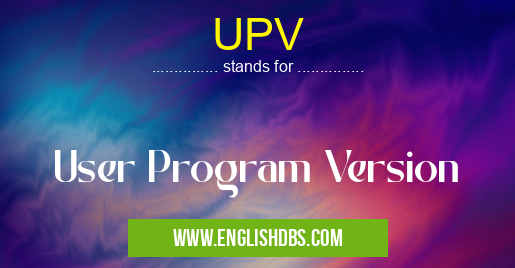What does UPV mean in SOFTWARE
UPV stands for User Program Version, and it's a crucial component of software development and management. User Program Versions (also known as "revisions") are used to manage the different versions of a software program that have been released over time. They help identify where changes may have been made in the source code, provide an easy way to upgrade, and allow compatibility with other versions of the same program.

UPV meaning in Software in Computing
UPV mostly used in an acronym Software in Category Computing that means User Program Version
Shorthand: UPV,
Full Form: User Program Version
For more information of "User Program Version", see the section below.
Essential Questions and Answers on User Program Version in "COMPUTING»SOFTWARE"
What is UPV?
UPV stands for User Program Version and refers to the release of an application or software that contains updates, bug fixes, user-requested features and other improvements.
How often is a new version of an application released?
It depends on the developer. Many applications and programs are updated monthly or on a quarterly basis but some may be updated more frequently while others are only updated yearly.
How can I tell which version of an application I'm using?
Generally, you can find out what version of an application you're using by navigating to its settings or preferences menu - there should be a section indicating the current version number. Alternatively, you could try Googling “[name of application] + version†and see if any results come up.
What does “beta†mean in terms of UPV?
A beta version of an application or program is basically a test release before it's officially launched or sent out to users. Beta versions usually include new features that the developers want to get feedback on from those who use it.
What is the difference between beta and final versions?
A beta version will contain various elements in development such as unfinished functions or known bugs that still need fixing — these may eventually be included in the final release depending on user feedback. Final versions are considered stable and have been tested extensively to ensure they work as expected without any major issues.
Should I always update my applications when prompted to do so?
Generally speaking, yes — updating your applications often means you'll benefit from improved features, bug fixes and security patches. However, it's adviseable that you wait until a few people have used the latest update just in case any major issues arise with it.
Are there any risks associated with updating my applications?
Generally no - developers work hard to ensure upgrades don't introduce any errors into their applications or interfere with other apps on your device. That said, if something goes wrong (which rarely happens) then backing up your information beforehand can help you manage any potential data loss.
Final Words:
In short, User Program Versions (UPVs) are essential components in cutting-edge software engineering today. They provide invaluable insights into how programs evolve over time and make upgrading user programs significantly easier - dramatically reducing maintenance costs for both developers and users alike!
UPV also stands for: |
|
| All stands for UPV |
